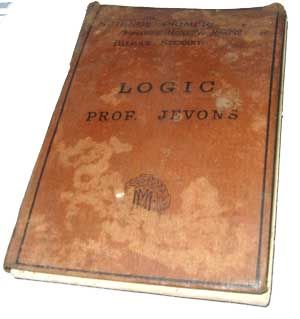In fact, for many people of this type, logic as a concept is as foreign as a vending machine on the moon. I listen to the conversation of my 13 year old daughter and often find blatant contradictions following each other, sentence after sentence. Attempting to correct her or point out the incongruence of her talk is entirely futile. It seems that the problem is not just that she has flawed logic, but rather that she doesn't seem to understand the concept.

Perhaps it is because she is more emotionally driven than intellectually oriented. I know for a fact that it is not that she is unintelligent, for she has an above average IQ, nor is the problem one of environment, for we often discuss a wide variety of things in the family setting and my wife and I are constantly trying to instill in her the importance of thinking properly.
Certainly there may be personality differences, maybe characteristics passed down from previous generations, partially a corruption from the peer environment and certainly the pervasive mangling of our language with SMS talk, but I suspect there is another contributing factor.
I think very few people naturally and instinctively think with strict logic, and it's certainly something that can be vastly improved with the right teaching and a disciplined use of language. This leads me to a thing that I have suspected for some time now. Students are not taught how to think properly in school. Even the scientific method seems to be poorly taught.
By this I mean the concept of gathering accurate facts, taking into consideration various assumptions, applying logical thought and argument to this information (perhaps using proven laws or formulae) and then constructing to a rational conclusion.
Many years ago I believe a subject was taught in schools called "Logic". I am not sure when this was removed from the curriculum, (certainly I was never taught this subject in school), but I feel it is a loss that is greatly to be lamented.

This is the oldest book I own and was printed in 1883
The key ability to form rational and coherent sentences that convey accurate communication is absolutely essential for even daily survival in life (assuming one has to actually have contact with people daily which is usually the case for most people). Every day we have to convince people in our lives of certain things in order for them to see our point of view or to sway them in their decisions that affect us. For instance a child might want to convince a parent that they are responsible enough to catch a train on their own, or to go see a live band. A worker might need to convince his or her boss to give them a pay-rise, a mother might need to convince her daughter of the importance of modest dress, and a wife might need to convince her husband of the necessity of mowing the lawn. In order to be successful in each of these endeavours, one must be able to sway a person's opinion by the use of rational argument.
From another perspective, logic is valuable in helping us make decisions in our lives. If we can weigh up all of the possibilities logically then we are far better equipped to make the right decision. From decisions as fundamental as choosing the right clothing to suit each particular day, to complex decisions such as choosing a place to live, which might depend on issues such as proximity to shops, schools, transport and other facilities, quality of the neighbour's and the environment, size of dwelling, aspect and design, we discover that clear-minded logically thinking is invaluable in coming to an appropriate conclusion.
I suspect many people are ill-equipped to make many decisions based on logic and so their decisions are fundamentally emotional and often illogical in their nature. I think this is what we mean when we say someone does not have common-sense. Unfortunately I think this term is a misnomer. Common sense is anything but common, and it seems to be becoming less and less common, and young people are suffering from educational neglect in this respect. Meanwhile they absorb the bankrupt philosophies of modern thought.
Surely things will not improve until we begin to make common-sense live up to its name by becoming common again.
No comments:
Post a Comment